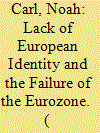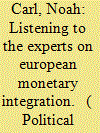| Srl | Item |
| 1 |
ID:
156786


|
|
|
|
|
| Summary/Abstract |
Since late 2007, the Eurozone has been embroiled in a crisis that has seen GDP per capita stagnate, public debt soar, and unemployment reach record levels. This article argues that the Eurozone crisis will inevitably force fundamental changes in the structure of the EU. The only way to make the Eurozone work is through deeper fiscal integration of Eurozone economies. Yet wholesale fiscal integration cannot be achieved in the near term, due to the fact that EU citizens continue to identify more with their own nationalities than with Europe as a whole. The Eurozone economies of southern Europe will, therefore, continue to flounder, leading to further anti-EU sentiment. Anti-EU sentiment may eventually increase up to the point where one or all of these countries leave the Eurozone or the EU altogether. These propositions are supported with arguments from economic theory, and are bolstered by evidence from surveys and opinion polls.
|
|
|
|
|
|
|
|
|
|
|
|
|
|
|
|
| 2 |
ID:
156790


|
|
|
|
|
| Summary/Abstract |
I would like to thank Dr Schelkle for writing an interesting and instructive comment on my article. While there is much to agree with in her comment, there are also a number of points that I wish to contest. I will take these points in turn.
|
|
|
|
|
|
|
|
|
|
|
|
|
|
|
|
| 3 |
ID:
159996


|
|
|
|
|
| Summary/Abstract |
The political discourse is characterised by two opposing ideals of hard and soft Brexit. In this article, we present evidence of attitudinal types that map neatly onto these archetypal views. The hard Brexit view is defined by issues that eurosceptics prioritise, most prominently sovereignty. By contrast, europhiles prioritise cooperation with Europe in terms of scientific collaboration and market access. However, attitudinal types are not either/or in the minds of the British public, and many prioritise all or none of the issues. Further, the two opposing positions together account for 37 per cent of the public's view. That is, just over one‐third differentiate between the salient issues in ways congruent with political ideals. National identity plays a particular role in the sociodemographic profiles of these attitude types. Older people have a strong stance in any direction (sovereignty, cooperation, or both), but national identity is linked to differentiated positions (sovereignty only or cooperation only).
|
|
|
|
|
|
|
|
|
|
|
|
|
|
|
|